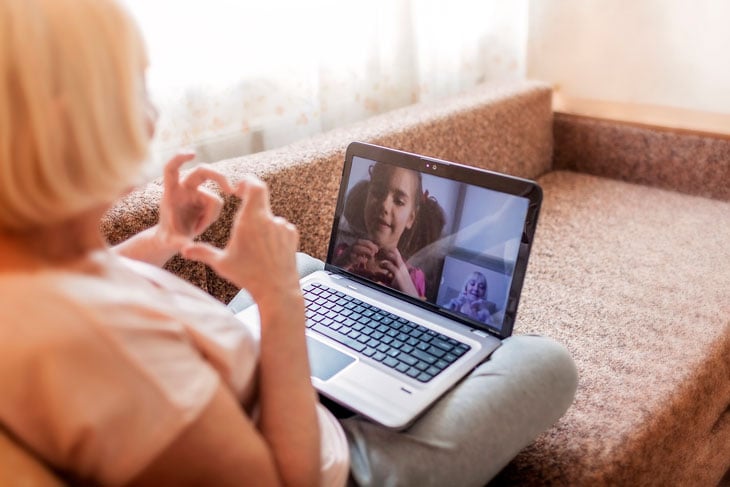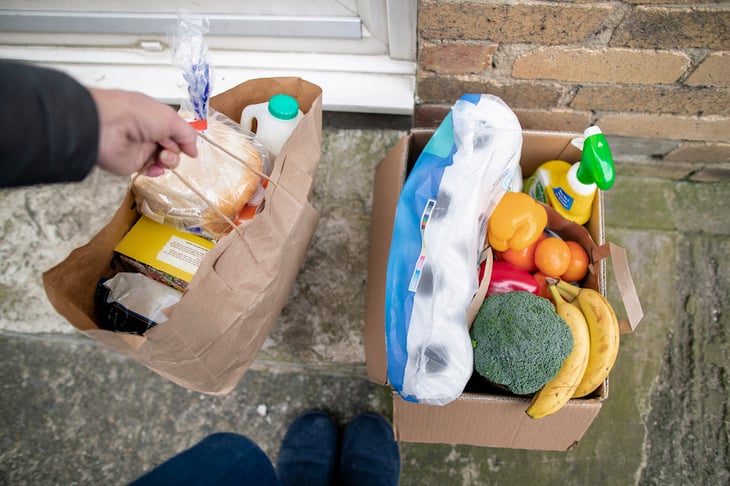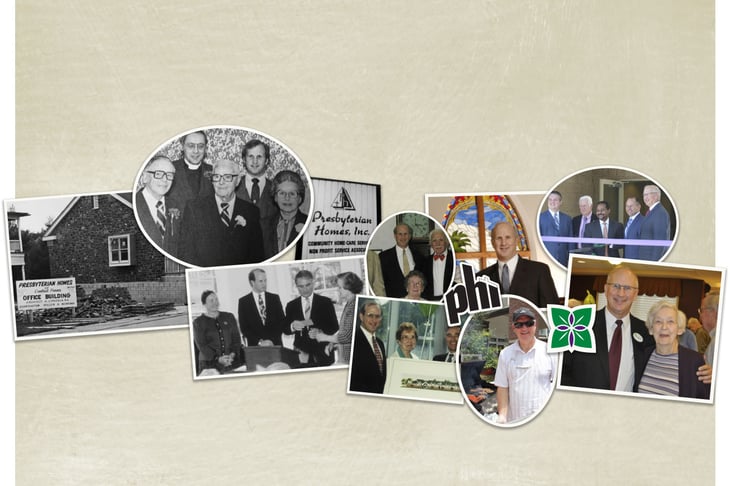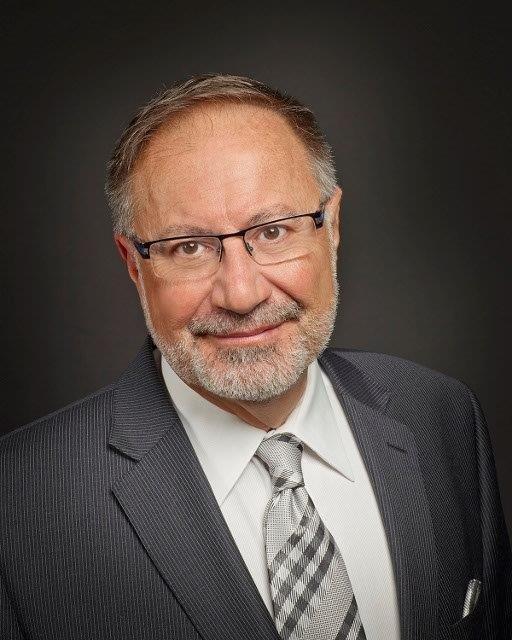
COVID-19: Q&A With CEO Jim Bernardo
In the midst of the ongoing pandemic, Presbyterian Senior Living, and the senior living industry as a whole, has received a large influx of questions regarding COVID-19. Here, our CEO, Jim Bernardo, answers ten frequently asked questions.
1. What are some of the most positive trends you've seen in the senior living industry since the start of the pandemic?
Clearly, it has been the dedication of the staff. Regardless of the level of living, the staff has demonstrated a commitment to respond to the changing needs of the people they serve. There are so many examples – in our nursing centers, care staff has served those residents who have been impacted by this virus by not only caring for the physical needs but tirelessly working together to create a family-like setting. Examples of this focus on those we serve occurred at every level throughout our communities.
2. What have you found most moving throughout the PSL network during this time?
A spirit of generosity has always been present throughout PSL, and has now become abundant during these difficult times. In addition to the generosity of selflessness and service that is continually demonstrated by our staff, our residents have been generous in many ways. Their overwhelming response to help PSL raise nearly $500,000 for our Caring Communities Employee Hardship Fund, has demonstrated care and concern for the staff who serve them who may currently be experiencing extreme hardship.
3. How is PSL fostering an increased sense of community during isolation?
There have been many examples of how staff and residents worked to support the social needs of residents and their families. Since the beginning of this situation, PSL staff and residents have taken ownership by using a variety of means, including technology, to battle social isolation. Our staff has made it possible for health center and personal care residents to stay connected through video conferencing and have even arranged for virtual "birthday parties" by families located near and far. Residents have worked hand-in-hand with staff to assure that the most vulnerable do not feel socially isolated.
4. How do you anticipate it looking for communities to return to "normal" life?
Normal life at PSL has always been and will always be determined by our commitment to being prepared to support our residents' desire to have a purposeful life. Like the rest of the country, we will need to balance the needs of our individual residents with the safety of their community. During the most restrictive days of the pandemic, our staff and residents recognized what Peter Marshall, former US Senate Chaplain, said, “May we think of freedom, not as the right to do as we please, but as the opportunity to do what is right.” I see no reason that that will change as we move forward.
5. There is a lot of concern among family members globally about the safety of their loved ones in a skilled nursing or personal care/assisted living setting. Why would anyone want to move to a community at this time?
The residents we serve in our communities have benefits and advantages that people in the community at large do not. We have an entire operational and clinical team working to keep everyone safe. The residents don't have to worry about food or basic necessities. There are built-in support systems to prevent social isolation. Our clinical teams are available to respond around-the-clock in the event someone gets sick. Every precaution is taken to prevent the spread of COVID-19, and CDC guidance is followed closely to protect the health and well-being of residents and staff.
6. What has the media gotten wrong about COVID-19's impact on senior communities?
As an organization, we have been very transparent with our cases by actively communicating with our team, residents and families and have provided regular opportunities to remotely contact their family members. There is a disconnect between what they hear on the news and the reality of what we are experiencing. As we think about what is happening in nursing homes, we need to think of this not as a failure of nursing homes, but to view this as a failure of our society and our government to prepare and mitigate the onslaught of this insidious virus by providing testing and PPE. By not doing so, they are allowing it to ravage our most vulnerable seniors.
7. How has PSL's 93 plus years of experience helped us during these challenging times?
What has defined our 93 years of experience is how our staff, volunteers and residents embrace and expect PSL to live in a fashion consistent with our values. Inclusivity, transparency, commitment to quality, stewardship, commitment to our people, and providing community benefit are part of our foundation. These values defined how we behaved, what our priorities are, and how we allocated resources and fostered the necessary resiliency to continue to move forward.
8. How do you stay in touch with the impact this is having on residents and staff?
Our ability to leverage technology and our stakeholders' willingness to accept technology was perhaps the single most important way we continually engage our residents and staff. We could communicate with more people with greater frequency than was previously possible. This pandemic has transformed the expectations of what is "effective personal contact."
9. How has the pandemic shifted organizational priorities?
I would not describe our short-term and long-term priorities as having shifted, but would rather describe that certain priorities need to be in sharper focus. We clearly need to maintain a degree of vigilance and responsiveness to the impact of COVID-19, knowing it can and will emerge or recur in our geographic localities. The important part that technology plays not only in resident engagement, but also organization leadership, decision-making, and execution is one such organizational priority. While direct human contact will remain an important part of who we are as an organization, we believe that technology will make us much more effective.
10. How do you think PSL has pulled together as a team?
PSL frankly had a head-start of strong organizational values that already set the context for our leaders. In the normal course of business, in a crisis like this, thousands of employees make hundreds of decisions every day. The leader sets the course and the destination, and others must take it from there. At every level, empowerment and support are what got the job done. We constantly communicated who we are, what we believe, what we value, and what matters most. We especially communicated the trust that we had in all team members to do what was best for the populations we serve.
For more information on the preventive measures in place at PSL communities amidst COVID-19 outbreaks, as well as useful resources for residents and family members, please visit www.psl.org/updates.
About Jim Bernardo
Mr. Bernardo has more than more than 35 years experience as a social worker and gerontologist, working in aging services his entire professional career in community and facility based settings. He has been employed by Presbyterian Senior Living since 1985 as an Administrator, Executive Director, regional Operations Director and Executive Vice President prior to assuming the role of CEO. Mr. Bernardo is actively involved in the professional community serving positions of state and national leadership. He has served on the Board of Directors of Leading Age, as the associations’ treasurer, and past chair of its membership and education committees. He is also a past Chair of LeadingAge PA. Bernardo serves CARF-CCAC as a member of its international standard review process and surveyor.


